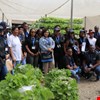
/ Southern Africa
Stakeholders, including youth, deepen their understanding of the Water, Energy, and Food Nexus
Various stakeholders in the Water, Energy, and Food (WEF) sectors including early career researchers, postgraduate students, managers, policymakers, and practitioners have had the opportunity to deepen their understanding of the WEF nexus, as a transformative approach to sustainable natural resources management and socio-economic development.
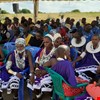
/ Southern Africa
SADC promotes climate-resilient Integrated Water Resources Management in Tanzania
The Southern Africa Development Community (SADC), in collaboration with the Global Water Partnership Southern Africa (GWPSA), implemented a climate-resilient integrated water management pilot project in the Wami/Ruvu Basin, in Tanzania, that is aimed at helping communities living within the Basin adapt to the adverse effects of climate change.
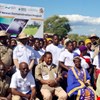
/ Southern Africa
SADC Commended for Supporting a Malawi Community with a Water, Energy, and Food Nexus Project
Kamuisa village in Dedza district is just a few meters from Lake Malawi, the fifth largest freshwater body in the world, and yet the community could not produce enough food to last all year round. The community could not cultivate enough during the rainy season and did not have the infrastructure to collect water from the lake. The Southern African Development Community (SADC) Secretariat came in to support the community to establish a climate-resilient water, energy, and food nexus project that would utilise water from the lake for irrigation of various crops and domestic use.
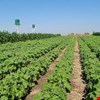
/ Southern Africa
Zambia’s Katapazi WEF Nexus Demonstration Project to Help Reduce the Impacts of Climate Change
On 21 June 2023, the Southern Africa Development Community (SADC), in collaboration with Zambia’s Ministry of Energy, and the Ministry of Agriculture handed over the Katapazi WEF Nexus Demonstration Project to the community. The project is located in Katapazi area of Kazungula District, Southern Province in Zambia.
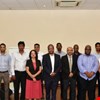
/ Southern Africa
Four SADC Oceanic States collaborate to develop a Water, Energy, Food & Ecosystem Security Nexus Regional Programme
Four SADC Oceanic States of Comoros, Madagascar, Mauritius, and Seychelles are collaborating to develop a Water, Energy, Food & Ecosystem (WEFE) Security Nexus Regional Programme that promotes a multi-sector approach in ensuring natural resource use efficiency, whilst achieving water, energy, and food security.
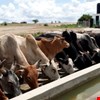
/ Southern Africa
Botswana and Tanzania record remarkable progress in climate-smart demonstration projects
Botswana and Tanzania have recorded remarkable progress in the implementation of climate-smart pilot projects addressing Water, Energy, and Food securities through the Global Climate Change Alliance Plus (GCCA+) Project being implemented in the two countries.
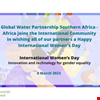
/ Southern Africa
GWPSA Celebrates International Women's Day
The International Women’s Day is celebrated on 8 March 2023 (IWD 2023) under the theme, “DigitALL: Innovation and technology for gender equality”.
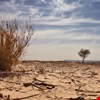
/ Southern Africa
Eswatini Government mobilizes private sector to be part of climate action
The Government of Eswatini says the private sector needs to get involved in climate action to protect their own as well as the nation’s investments from the impacts of climate change. Government data shows that 80 percent of surveyed private sector enterprises reported that their businesses had been impacted by climate-related events, most of which had involved extreme and erratic rainfall and drought.
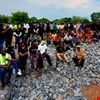
/ Southern Africa
Lesotho ICM learning best practices in integrated catchment management from Zambia
The GIZ, GWPSA, and Lesotho Integrated Catchment Management (ICM) Coordination Unit (CU) undertook a learning exchange mission in Zambia from 24th to 28th October 2022, to capture best practices and experiences in catchment protection and restoration in the country. This engagement was aimed at the technical public service directors and heads of mandated institutions responsible for water, land, meteorology, local government, environment, food, and agriculture.
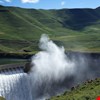
/ Southern Africa
Integrated Water, Energy and Food Projects Gain Ground in Southern Africa
Southern Africa Development Community Member States have embraced the integrated planning and implementation of projects in the water, energy and food (WEF) sectors, with 14 holding national dialogues where they identified priority investment projects that could be taken further for bankability and mobilising financing for Implementation.